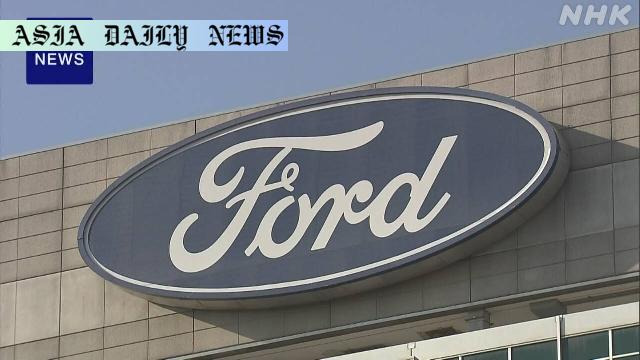Tariffs are affecting automakers’ bottom lines as Ford reports a net 36-million-dollar loss despite increased revenue.

The Impact of Tariffs on Ford’s Financial Performance
The recent tariff measures implemented by the Trump administration are beginning to take a notable toll on major U.S. automakers such as Ford Motor Company. These measures, while intended to bolster domestic manufacturing, have led to increased costs for companies reliant on imported components. In its latest quarterly report, Ford disclosed a net loss of $36 million for the April-to-June period, a striking contrast to its record-setting revenue of $50.2 billion in the same timeframe—a 5% increase from the previous year.
More than 75% of the vehicles sold by Ford in the United States are manufactured domestically. However, critical parts and components for these vehicles are often imported, which exposes the company to the full brunt of the 25% tariffs on imports introduced by the government. Consequently, Ford is projecting a staggering $2 billion reduction in its annual profits due to these additional costs. It is evident that while promoting economic policies geared toward homegrown production, the knock-on effects on companies, even those heavily rooted in U.S. manufacturing, can be significant.
The Role of the Electric Vehicle Program Cancellation
In addition to the financial strain brought on by the rising tariffs, Ford’s decision to cancel a planned electric vehicle (EV) program has compounded its challenges. While details surrounding the program’s termination remain scarce, the company has suggested that it was a necessary decision in light of shifting priorities and the increased financial burden caused by tariffs. This cancellation not only represents a missed opportunity for growth in an increasingly competitive EV market but also underscores the difficult decisions automakers must make when navigating an unpredictable financial landscape.
The automotive industry is seeing rapid changes globally with significant investments in new technologies and greener alternatives to traditional internal combustion engines. Ford’s decision to shelve its EV program may leave it disadvantaged in the race to dominate this growing market, particularly as competitors continue to make large strides forward. The company has indicated that it remains committed to its broader electrification strategy, but the financial constraints highlight the challenges of balancing innovation with profitability.
Broader Implications for the Automotive Industry
Ford’s experience offers a cautionary tale to other major players in the industry. Tariff measures, while designed to encourage domestic production, can pose significant risks to companies that rely on a global supply chain. Automakers are particularly vulnerable due to the high costs of production, research, and development, compounded by the logistical challenges of shifting supply chains in response to local policies. This situation highlights the complexities of modern manufacturing, where components sourced globally converge to create a final product.
The broader economic implications of these tariffs extend beyond Ford and other automakers. The increased costs of parts and vehicles could eventually trickle down to consumers, resulting in higher prices at the dealership. Additionally, the financial strain on the industry may slow advancements in critical technologies, such as electric and autonomous vehicles, limiting competitive growth in a rapidly changing global market. Moving forward, policymakers and industry leaders alike will need to consider these factors as they navigate the intersection of economic protections and globalization.
Commentary
Understanding the Financial Strain Tariffs Place on Automakers
The recent financial results announced by Ford Motor Company shine a spotlight on the ripple effects that tariff policies can have on businesses, even those seen as pillars of a domestic economy. At first glance, it might seem contradictory for a company reporting record revenues to also post a net loss for the quarter. Upon closer examination, however, the causes become clear: escalating costs due to newly imposed tariffs on imported parts have significantly eaten into profits.
What’s striking about this situation is how the administration’s policies designed to stimulate domestic production have inadvertently created challenges for companies like Ford. Despite manufacturing the majority of their vehicles in the U.S., they remain dependent on global supply chains for parts. The application of these tariffs, therefore, underscores the complexity of balancing economic policies and their real-world impacts. It also highlights how measures intended to protect domestic jobs and industries can sometimes have unforeseen consequences on the ground.
A Missed Opportunity in the Electric Vehicle Market
Another major takeaway from Ford’s recent revelations is the strategic decision to cancel its electric vehicle (EV) program. This move, though likely necessary to address short-term financial pressures, demonstrates a concerning shift. The automotive industry is rapidly embracing electrification as the future of mobility. By shelving an EV initiative, Ford possibly risks trailing behind competitors in the race to innovate and capture market share in this field. Companies such as Tesla and other legacy automakers are doubling down on their EV commitments, knowing that the global market is poised for significant growth in this sector.
Finding Balance Between Policy and Global Interdependence
Moving forward, Ford and other automakers must navigate murky waters, balancing domestic production demands with an increasingly interconnected global economy. This scenario also brings to light the need for nuanced policymaking that accounts for the realities of modern manufacturing. While the intent of the tariffs is to bring economic benefits, their eventual ramifications across industries should not be overlooked.
In conclusion, the challenges faced by Ford are emblematic of broader trends in today’s business landscape. Companies and policymakers alike must work together to find sustainable solutions that promote economic growth without stifling innovation or hindering critical industries.


